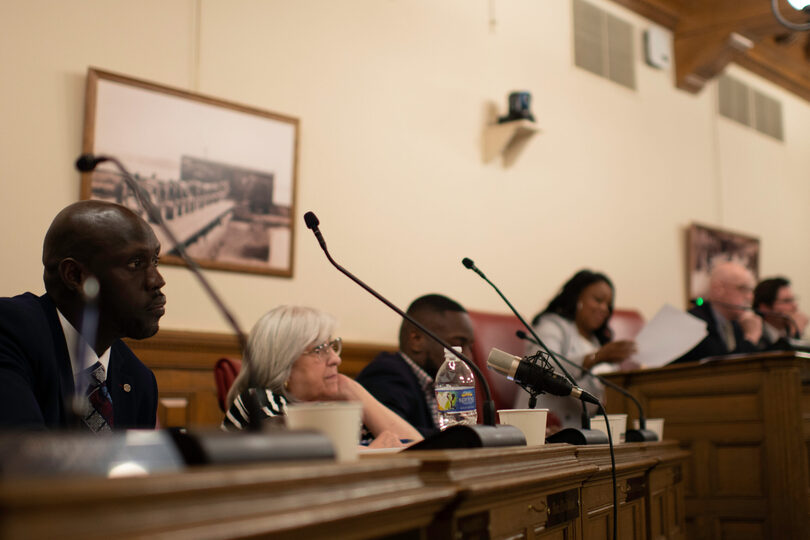Mayor Walsh’s $348.4M proposed fiscal budget draws community concerns

Mayor Ben Walsh proposed a $348.4 million fiscal year budget for 2026. At a Syracuse Common Council hearing Tuesday, community members and local leaders shared concerns about the city's spending. Ike Wood | Staff Photographer
Get the latest Syracuse news delivered right to your inbox.
Subscribe to our newsletter here.
Community members and local leaders voiced concerns about Syracuse Mayor Ben Walsh’s proposed $348.4 million budget for the 2026 fiscal year during the Syracuse City Common Council’s Tuesday public hearing.
The proposed budget increased from last year’s by $7.4 million, raising concerns about the efficiency of the city’s spending. It aims to invest in the city’s housing strategy, increase internal city revenue and implement a 2% increase on property taxes along with water rates.
Syracuse Republican mayoral candidate Thomas Babilon called on the council to cut the budget’s property tax hikes, increased water fees and “unnecessary” spending. The budget would result in a $34 million deficit of city revenue if passed, he said.
“Every single one of you and the mayor are responsible for making it more expensive to live here,” Babilon said. “This council needs to do this job, do its job, cut the budget and balance it without any tax or fee increases.”
If passed, the budget will fund a project to recommission a former fire department station downtown and establish a new Syracuse Police Department program aimed at preventing domestic violence.
The budget proposes a tax and water cost increase after the $1.5 million loss in city investment. The loss comes from a termination of American Rescue Plan Act funding, used to support local governments during the COVID-19 pandemic.
Jackie Lasonde, Southside Coalition for Equity and Justice president, told councilors increases on property taxes and water are unfair to the SouthsideSouthside neighborhood. She said the community should be addressed before raising the cost of living, citing poor conditions and a lack of proper city investment.
“I suggest that the job be done before you start asking for more of an increase,” Lasonde said.
Many Southside residents have lead in their water systems, she said, and an increase in water prices would be a disservice to community members.The Southside has seen the highest levels of lead-contaminated water, with 32.5% of children having high blood lead levels, according to a 2020 Harvard Public Health study.
“If we utilize funding and cut some lead types out of the scene, perhaps people would be more interested in paying anything for an increase,” Lasonde said. “We are paying for services that we’re simply not getting.”
In the proposal, Walsh promises to upgrade the city’s water infrastructure. He also hopes to hire two new code enforcement inspectors to inspect residential properties for maintenance requirements, according to the proposal.
Common Councilor At-Large Amir Gethers said the council sympathizes with the concerns raised at the hearing.
“The concerns weren’t false, they were true,” Gethers said. “That’s what we’re considering with this upcoming budget, when we determine what we’re going to cut and what we’re going to keep.”
IT experts, including Advanced IT Founder and President Susan Fahrenkrug and Kyle Warford, an IT Manager at Generation Electrical Supply & Lighting, shared concerns about the budget’s transparency in IT spending.
They called on the council to consider previous spending under the Walsh administration, including its “payroll modernization project.” Launched in 2019, the internal initiative set to replace the city’s outdated payroll system is still incomplete.
The city has spent over $10 million to complete the project, raising controversy with its contracts involving local IT companies. The backlash prompted a plan for an independent audit, which was approved Jan 21.
Fahrenkrug filed a complaint with the city on Nov. 6, condemning the relationship between her local IT Firm, Advanced IT, and its role in payroll modernization projects. At the hearing, she urged councilors to implement transparency and responsibility with IT spending.
“The city is spending money and they don’t know how to spend it,” Fahrenkrug said. “They’re not utilizing IT professionals that can walk them through, hold their hand and show them where they should and shouldn’t spend even if it’s just a consultation.”
The council will work on revising the proposed budget by its May 8 deadline.





